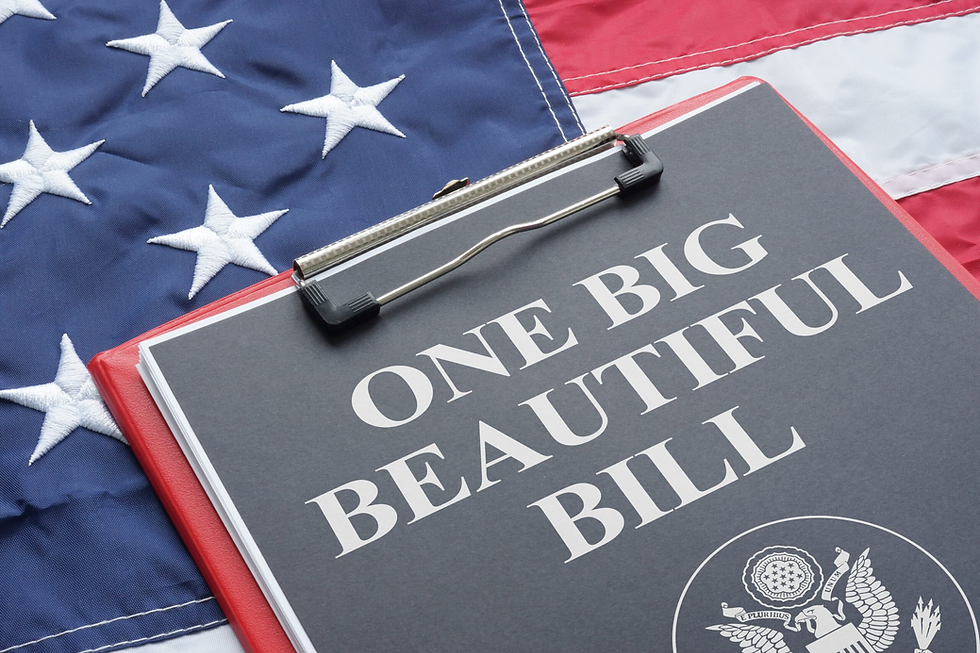OBBBA Impact
- 968829
- Aug 13, 2025
- 3 min read

The One Big, Beautiful Bill Act (OBBBA) was signed into law on July 4, 2025, and with it come many new tax provisions that may directly affect you.
There are many tax provisions contained in OBBBA beyond the ones Three Flows has highlighted here.
Three Flows does not bear any responsibility for the complete and/or accurate interpretation of the bill. Please consult your CPA for clarification.
Extension of expiring tax provisions
The centerpiece of OBBBA is a permanent extension of most of the provisions of the Tax Cuts and Jobs Act of 2017 that apply to individual taxpayers and were scheduled to expire at the end of 2025. These provisions include, among many others:
Lower income tax brackets with the top rate at 37% instead of 39.6%;
The higher standard deduction, with an additional $6,000 deduction for taxpayers age 65 and over ($12,000 for married taxpayers who are both age 65 and older);
The $750,000 mortgage interest limitation, with a renewed deduction for mortgage insurance premiums;
The elimination of the miscellaneous 2% itemized deductions, including investment advisor fees, tax preparation fees, and unreimbursed employee business expenses (except qualified educators, who will be allowed to deduct many of their unreimbursed expenses);
The increased Child Tax Credit, with modifications that make the credit more attractive;
Permanent extension of the §199A 20% qualified business income deduction for business owners, with minor modifications; and
The increased unified estate and gift tax exclusion, with a bump up to $15 million on January 1, 2026.
State and local tax deductions
The itemized deduction for state and local taxes (SALT) has been temporarily increased from $10,000 to $40,000 for five years. The increased deduction is phased out for higher earners. Taxpayers who are owners of passthrough business entities and make a passthrough entity elective tax election can still use the election to maximize their SALT deductions.
Itemized deductions and alternative minimum taxes
There are new limits on itemized deductions. The alternative minimum tax is reinstated, which will require planning going forward to minimize future tax liabilities.
Charitable contribution deductions
Charitable contributions are subject to three new OBBBA provisions:
Non-itemizers can claim a $1,000 charitable deduction ($2,000 for married taxpayers filing jointly);
Individual taxpayers who do itemize must exceed 0.5% of AGI before any charitable donation qualifies for a deduction. This replaces the prior "no floor" structure and creates a modest threshold before deductions apply, and;
Taxpayers who make charitable contributions to certain scholarship-granting organizations that fund scholarships for K-12 students can choose to claim either an itemized deduction or a new tax credit of up to $1,700.
New deductions
Three brand-new deductions for individual taxpayers are available starting in 2025. These deductions may be known better by what they’ve been called in the news: "No tax on tips," "No tax on overtime," and "No tax on qualified car loan interest."
For each of these items, new income tax deductions are available for taxpayers who receive certain tip income, are paid overtime by their employers, and who incur interest on the purchase of a new vehicle assembled in the United States.
Each of these provisions contains multiple limitations which we can discuss further if they apply to you (optional).
Disaster relief
Taxpayers impacted by federally declared disasters in 2025 may qualify for additional tax relief.
Energy credits going away
OBBBA repeals many energy credits, including
All three clean vehicle credits for vehicles acquired after September 30, 2025;
Both of the energy credits available to homeowners who make certain energy-efficient improvements or install solar property, home batteries, and heat pumps, among other items, are no longer available after December 31, 2025.
Business provisions
In addition to the tax provisions applicable to individual taxpayers, OBBBA contains many business provisions, including:
A permanent 100% bonus depreciation rate for assets acquired after January 19, 2025;
An increased §179 expensing limitation for assets placed in service after December 31, 2024;
Immediate expensing of research expenses with a special election to immediately deduct previously amortized research expenses; and
An easing of the business interest limitation rules.

Comments